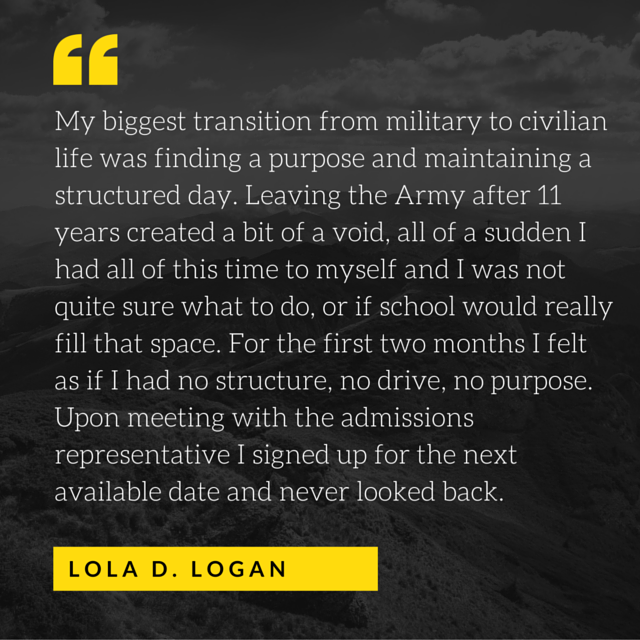Massage Therapy as a Career for Veteran’s
We sat down with Lola D. Logan, an NHI student who served in the United States Army for 11 years as a Healthcare Specialist and Combat Medic to learn more about her and why she choose NHI. Read about her inspiring story as she transitioned from military life to civilian life and how she found her passion in massage therapy.

Q1: What was your number one priority in selecting a new career?
Lola: My number one priority in selecting a new career was to remain in the healthcare field. I truly believe in helping people achieve an optimal level of health and that this level of health can be achieved organically, naturally and from a preventive standpoint. I believe in the sciences of medicine; research, surgery, and pharmaceutical intervention when absolutely necessary but I also believe the body can heal itself and an ounce of prevention is the purest form of medicine. I wanted to pursue healthcare in a manner that was collaborative in nature and allowed the patient to be an active participant through health and nutritional education in order to achieve that optimal level of health. My ultimate goal is to be a Chiropractor, and I believed a career as a Massage therapist would provide me with a strong and wonderful foundation in this aspect of healthcare.
Q2: How has your military training helped you as a Massage Therapist?
Lola: In the military I was trained to be and certified as an Emergency Medical Technician but was allowed to work in a variety of clinical environments which exposed me to different occupations within the healthcare field and their patients. My first few years in the Army, I worked in the ER Department, Primary Care, Orthopedic Clinic, Occupational and Physical Therapy, Dermatology Clinic, Surgery Clinic, Family Medicine Clinic and an Urgent Care Clinic. This allowed me to have an in depth background and exposure to a variety of health dysfunctions; what it looks like, how to identify it, possible treatment methods and types of pharmaceutical intervention. Although injury and illness can occur, I always knew it was possible for the human body to achieve an optimal level of health and subsequently prevent many illnesses and injuries.
Q3: When choosing a school for your massage therapy training what stood out to you about NHI?
Lola: When choosing a massage school the things that stood out to me about National Holistic Institute was their curriculum; they train students in several modalities, have classes in body sciences, and business classes. After I visited the campus I had an opportunity to sit in a class and meet with an admissions representative, I knew that National Holistic Institute was the perfect school to attend.
Q4: What was your biggest challenge in transitioning from the military to civilian life?
Lola: My biggest transition from military to civilian life was finding a purpose and maintaining a structured day. Leaving the Army after 11 years created a bit of a void, all of a sudden I had all of this time to myself and I was not quite sure what to do, or if school would really fill that space. For the first two months I felt as if I had no structure, no drive, no purpose. Upon meeting with the admissions representative I signed up for the next available date and never looked back. National Holistic Institute has a staff of individuals who are competent and proficient in what they do no matter what their particular job is at the school. Everyone here cares about our success as a student and provides numerous ways to achieve success. I appreciate the structure that the school provides and the experience of being part of an organization that provides each student a unique educational experience. Now I wake up and I am excited to go to school, I am excited to learn, I am excited for clinic days when I can apply the knowledge I have learned during the week, and I am excited to pursue a career which is as rewarding as massage therapy.